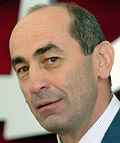In an interview given to the Public TV of Artsakh the first president of the Nagorno Karabakh republic and second president of Armenia Robert Kocharyan has discussed a number of issues, which primarily concern the NKR independence.
Concerning the negotiations over the issue of Karabakh conflict settlement and Karabakh as a party of the negotiation process Kocharyan said, “I do not agree with the opinion that Karabakh does not take part in the negotiations. It is not like that. Karabakh is participating in the negotiations. Karabakh does not take part in one phase of the process, which is the series of meetings of the presidents of Armenia and Azerbaijan. The format of negotiations is pretty large and Karabakh takes part in negotiations with the co-chairs of OSCE Minsk Group. Of course we mean full participation on part of Karabakh. During the negotiations at the level of presidents Karabakh’s interests are represented by the president of Armenia. For example, during my tenure I used to discuss all issues and details with the president of Karabakh of that time Arkadi Ghukasyan. In fact, it was somehow a delegated issue. But this is the situation. I do not suspect that Karabakh will fully participate in the negotiation process. It is hard to say how long it will last. You know, there was a time when we were very close to the end. One thing is for sure that in the new history such issues have been resolved in favor of the self-determined nations. It concerns all issues without any exceptions.” Robert Kocharyan believes that time works in favor of Karabakh. “But we should not think that after Karabakh’s recognition the life will change rapidly. You know, we should live in a manner that we believe it has already happened long ago. We don’t need anybody’s stamp for our independence recognition. The fact has already happened and we must work fully and strengthen the Republic of Nagorno Karabakh. Time will come for that, we will have that opportunity too,” he said.
In answer to a question concerning Armenia’s and NKR’s achievements and failures Kocharyan said, “You are asking about phases. I do not want to talk about phases. There were a lot. The timeframe is very big. To talk about phases means to go back to the past and there is a risk that we will stay in the past. We are not in the age to live with memories. Let’s leave it for others to estimate what we have done or have not done.” Concerning the achievements and failures during these twenty years he said that there are countries that change much, and there are ones and stagnate, but he believes everything will be fine. The former president believes everything is about working and doing a hard work for development purposes. “I believe everything will be fine, but I wouldn’t say that we will have an excellent future,” said Kocharyan. He says that wealthy life is obtained due to hard every-day work and many efforts. “I would say the same about independence too. Because independence and recognition is not given but obtained,” Kocharyan added. The former president was asked about his ideals and said that he had not had the time to think about ideals because there were too many problems and issues with independence and state administration. “Later in a number of years when we had more experience and in our contacts we obtained more experience on state building, we started to better understand what kind of state we wanted to build and what kind of state would provide wealthy life for people, enable people to protect their system of values and face challenges. These three factors are very important and should be brought to balance. This issue still exists. That is why that word if ideal is not adequate here. There must be a very pragmatic approach so that we can find the best development model for Armenia and Nagorno Karabakh, which will enable to face the current challenges and be integrated with the international community, meanwhile keeping our national values. Because we also have a risk to lose in this process, which is even more in the globalized world.”

